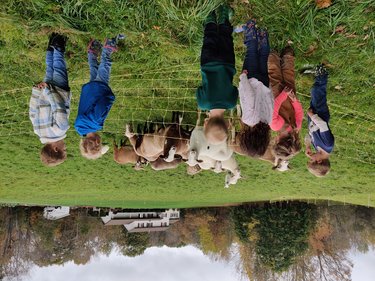East Berne couple teach kids life skills at Henrieka Farm Center
EAST BERNE — When Brittni Abriel is faced with a child with behavioral issues and needs to teach them better ways to express difficult feelings, her go-to response is to put them out to pasture.
A sheep pasture. Literally.
And it “works wonders,” she told The Enterprise this week. Abriel is a certified childhood and special education teacher who now runs educational programs at East Berne’s Henrieka Farm Center.
“Sheep and ruminants inherently have parasites around them and in their bodies, but the way they’re adapted to dealing with that, if they stay calm, their body doesn’t allow the parasite to take over,” Abriel explained. “But if they’re stressed out from, for example, a kid running around and chasing them, or screaming near them and frightening them … those parasites are able to grab hold and make them sick.”
It’s one of the early lessons she teaches all the young children who come to Henrieka Farm Center, and who might not yet have the emotional toolkit they need to get through their day-to-day life.
“It really connects with them that, ‘Wow, in this moment I need to be calm for the sake of the animals that are around me, because if I’m not calm, they won’t be, and they’ll get sick.’ It gives them extra reinforcement for slowing down and being present with oneself,” she said.
A wealth of other life lessons exist on farms, Abriel said, which is why she began offering those lessons in the form of after-school, daytime, and summer programs last year. She’s the architect of the programs, while her husband, Chris, manages the farm itself.
Both the Abriels, she said, are dedicated to public service — Brittni is a captain with the Vermont Army National Guard while Chris is a lieutenant in the Albany Fire Department — and she views teaching as a natural extension of that spirit. She previously worked with high school students at the Cobleskill-Richmondville Central School District to help them develop life skills.
The idea of applying those things to a farm setting came about in the early days of the coronavirus pandemic, when she was passing the time at home, watching her own kids interact with the family’s livestock.
“When we shut down the schools for that first bout of COVID,” she said, “I was sitting on my back porch with my chickens around and my cows out in the field, and my children … Whatever they were doing out in the field by the cows, I had this moment of, ‘Holy cow, you guys know so much and you’re so capable in your life with your skills at this young age.’
“It felt like something I really needed to do, to help give other children that kind of start in life, where their first interaction with education is through life skills and agriculture and learning as you do rather than sitting at a desk and focusing on the institutionalized form of academics.”
Last year was the Abriels first full year of offering their farm programs — which follow the Berne-Knox-Westerlo district schedule, including summers — and she said that it went “excellently.”
“It just created this joy in myself and in all the kids and families that come here, and gave a new vision of education to me,” she said.
The Henrieka Farm Center offers three programs:
— Little Sprouts, which is offered up to five days per week, for kids aged 3 to 6, and is “more of a free-exploration, child-led program,” Abriel said;
— Seedlings, a kindergarten program offered three days per week for kids aged 5 and 6, in which Abriel teaches the New York State standards; and
— Saplings, an after-school program for kids aged 6 to 12, offered two days per week.
Last year, the Abriels accommodated around a dozen kids, while now they’re working with almost 20, and still have space to fill, she said, adding that there are no deadlines for enrollment.
All of the programs take place entirely on the Abriels’ farm, which she said has a wooded area with caves and ponds that the kids have opportunities to explore, along with an outdoor classroom area that has jungle gyms and an obstacle course.
“On a given day, kids will be feeding chickens, collecting and counting eggs, brushing our Scottish Highlander cows, helping rotate the sheep,” she said. “Then the biggest thing they do is play, play, play, and they really learn an exceptional amount through playing … We do things like build shelters in the woods and catch frogs in the pond. Think about an outdoor activity on a farm and we do it.”
Abriel said that she never forces kids in the program to help with any of the chores, since the important part of it all is “just being around and seeing us working and doing things all the time to help these animals that rely on us” because it “imparts a great deal of responsibility and a desire to help.”
Kids get the added benefit of animal feedback, Abriel said, since the animals — cows in particular — grow affectionate toward their caretakers. “They reciprocate the work that you put into them,” she said.
Although Henrieka Farm Center is not officially registered with the state as a child-care facility, parents and guardians who are eligible to receive money through the new New York State Childcare Assistance Program can still send their kids there since the center is validated by the state through its legal exemption process, which involves extensive background checks, among other things.
Governor Kathy Hochul announced this week that the income eligibility requirements for the program would be increased so that families can make up to three times the federal poverty level and still apply. That means a family of one can earn up to $40,770, with the amount increasing by roughly $14,000 per additional person.
Abriel said that she chose not to seek registration through the state since its policies would prevent her from conducting her programs the way she thinks they need to be conducted.
“I’ve read through the requirements and I keep them in my mind and try to abide by them as much as possible,” she said, “but I am a fully outdoor program … so in the middle of winter, the kids are outside, and it’s cold out, but they’re dressed very well. They’re very active. We take stock of their bodies and work together as a group [asking questions] like, ‘How are you feeling right now? Are you feeling warm, feeling cold, and how do we adjust based on that?’ I’m teaching them all those skills, but that’s not something New York State really likes in childcare.”
She said that she might consider seeking charter-school status down the line, but that “this works very well for right now” while New York State “hopefully catches on to outdoor learning.”
Abriel pointed out that that type of education seems to be becoming more popular.
“When I first started getting everything in order, I had to go to Long Island to visit another farm school,” she said. “That was the closest one. Then, as I started working, I came across a woman in Saratoga Springs who was opening one right around the same time I was, and I was recently contacted by someone in Greenwich, maybe an hour away from us, and she’s been asking me questions, and I’ve been trying to help mentor her … I do think it’s catching on.”


